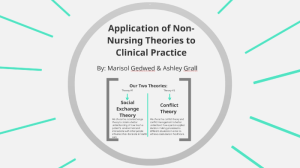Non-Nursing Theories
Title: Non-Nursing Theories in Healthcare: Enhancing Interdisciplinary Understanding and Practice
Introduction:
The field of healthcare is a complex and multidimensional sector that involves various disciplines, including nursing, medicine, psychology, sociology, and management. As the healthcare landscape continues to evolve, it is becoming increasingly important to recognize the value of applying non-nursing theories to enhance the understanding and practice of healthcare professionals. This essay will explore the application of non-nursing theories in healthcare and how they can contribute to delivering efficient and patient-centered care.
Body:
1. Theoretical Frameworks and Their Importance in Healthcare:
Theoretical frameworks are fundamental tools that provide a foundation for understanding complex phenomena and guide research and practice. While nursing theories have traditionally dominated the healthcare field, incorporating non-nursing theories expands the breadth of knowledge and offers innovative perspectives. Non-nursing theories, such as those from sociology, psychology, management, and organizational behavior, can help healthcare professionals gain a holistic understanding of patients, healthcare organizations, and the broader healthcare system.
2. Sociological Theory in Healthcare:
Sociological theories, such as symbolic interactionism and social exchange theory, can offer valuable insights into the behavior and interactions of patients, healthcare professionals, and communities. These theories explore the influence of social factors on healthcare outcomes, helping professionals understand the impact of culture, social class, and social networks on health and well-being. Integrating sociological theories into practice enables healthcare professionals to view patients within their social context, leading to more individualized care plans and improved patient satisfaction.
3. Psychological Theories in Healthcare:
Psychological theories, such as Maslow’s hierarchy of needs and cognitive-behavioral theory, play a significant role in understanding patients’ emotional and mental well-being. These theories allow healthcare professionals to address patient concerns beyond their physical symptoms, improving patient outcomes and overall quality of care. By considering psychological factors, healthcare providers can employ interventions that address patient motivation, emotions, and cognitive processes more effectively, facilitating a comprehensive approach to healing.
4. Management and Organizational Theories:
The application of management and organizational theories in healthcare settings is crucial for optimizing resource allocation, improving efficiency, and enhancing overall organizational performance. These theories, including leadership styles, change management, and quality improvement models, provide healthcare managers with tools to promote effective teamwork, communication, and collaboration among healthcare professionals. By adopting management and organizational theories, healthcare organizations can create a supportive environment that fosters innovation, continuous learning, and patient-centered care.
Conclusion:
Incorporating non-nursing theories into healthcare practice enhances interdisciplinary understanding and collaboration, leading to improved patient outcomes, effective resource utilization, and increased organizational performance. By utilizing sociological, psychological, and management theories, healthcare professionals can gain a deeper understanding of patients, their social context, and organizational dynamics. This integration enables healthcare organizations to deliver high-quality, patient-centered care that accounts for the complex web of factors affecting health and well-being. As the healthcare field evolves, embracing non-nursing theories will continue to be vital in addressing the multifaceted challenges and opportunities within healthcare delivery.









